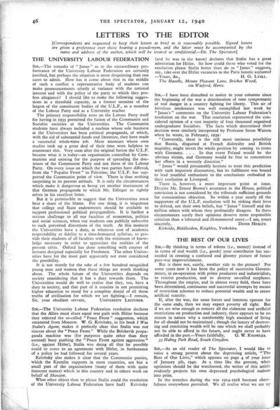Snt,—I have been disturbed to notice in your columns since
the beginning of the war a deterioration of tone symptomatic of real danger in a country fighting for liberty. This air of frivolous intolerance was well exemplified last week by " Janus's " comments on the University Labour Federation's resolution on the war. That resolution represented the con- sidered opinion of a vast majority of four thousand organised undergraduate Socialists. The facts which determined their decision were similarly interpreted by Professor Seton Watson when he wrote, in February, 1939 " Conversely, there is the still more ominous possibility that Russia, disgusted at French disloyalty and British stupidity, might invert the whole position by coming to terms with Germany. . . . In that event Poland .would be the obvious victim, and Germany would be free to concentrate her efforts in a westerly direction."
" Janus " would presumably hesitate to treat this prediction with such impatient discourtesy, but its fulfilment was bound to lead youthful enthusiasts to the conclusions embodied in their resolution at Liverpool.
There is, however, a more important point at issue. Despite Mr. Ernest Brown's assurance in the House, political conviction is not considered by the tribunals sufficient grounds for conscientious objection. So within a year nearly all the supporters of the U.L.F. resolution will be risking their lives to defend, not their own beliefs, but " Janus " himself and the million others with whom they profoundly disagree. In these circumstances surely their opinions deserve more responsible criticism than a laboured and ill-mannered sneer.—I am, yours


































 Previous page
Previous page